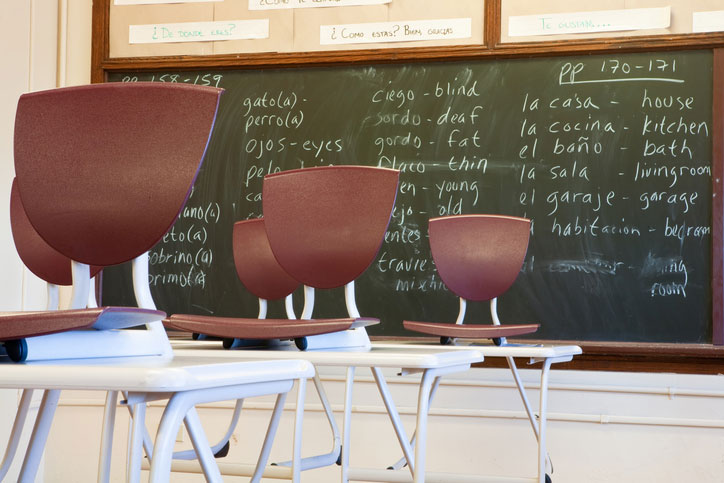Bachelor’s in Education
Whether you want to become a teacher, principal, education policy researcher, or something else in the education field, your first step is to earn a bachelor’s degree in education. Your bachelor’s education degree curriculum will cover the core components of teaching, including classroom management, leadership, learning styles, lesson planning, and teaching methods.
A bachelor’s in education allows you to specialize in different subject matters and grade levels that you plan to teach. Most states offer accredited teaching degrees for students across all grades, from preschool through secondary school. You can also seek out a degree in specific educational subsets, such as a bachelor’s in early childhood education if you wish to work with children during their early years. If your goal is to teach at the post-secondary level, you will most likely need to earn a graduate degree. Depending on your program, you can earn your education degree in a traditional classroom setting, in an online-hybrid format, or completely online.
Master’s in Education
A master’s degree in education is appealing for educators looking to distinguish themselves in competitive job markets, increase their salary prospects, advance to an administrative position, and specialize in certain fields. Curriculum at this level varies, but you can expect your program to include courses that touch on foundations of education, curriculum development, educational leadership, and culturally responsive practices. This is also your opportunity to focus even further on a specific subject area, such as literature, history, or chemistry.
Master’s teaching degrees usually take at least two to three years, but you can structure your master’s degree in education to fit your schedule, since many in-person programs are offered in the evenings to accommodate working teachers. Online master’s teaching degrees are even more flexible.
Doctorate in Education
If your professional goals include educational policy reform, a career in academic research and curriculum design, or an educational leadership position such as superintendents, you’ll want to pursue a doctorate in education. There are two types of education degrees at the doctoral level: a Doctor of Education (Ed.D.) and a Doctor of Philosophy (Ph.D.) in Education. The former is designed for teachers looking to move into administrative and/or leadership roles, while the latter is designed for teachers looking to pursue academic research and/or continue teaching at a higher level.
Depending on your focus, you will encounter classes on education policy, learning and development, and research analysis. These intensive teaching degrees typically take a minimum of three years to complete if you’ve already completed your master’s degree in education.
Teacher Certification
No matter which teaching degree you pursue, you’ll need to pass your state’s teacher certification exam to earn a license to teach in your state. Requirements for earning your teaching certificate vary based on where you live, but you should generally be prepared to pass a basic skills test, as well as one or more subject knowledge exams based on what you plan to teach. Your state may also require a pedagogy exam, where you’ll demonstrate your grasp of the practical skills of teaching.
Alternative Teacher Certification
If you already have a degree in a subject other than education and are thinking about becoming a teacher, alternative teacher certification could be a rewarding option for you. Alternative teacher certification gives professionals who have a degree in a different area a path to a career as a teacher instead, without necessarily needing to get another full-fledged education degree.
The requirements of alternative certifications vary by state, but in general, alternative certificate programs are designed to complement the degree you’ve already earned with education classes related to classroom management, learning theory, and practical teaching strategies. These programs are short-cuts designed to help you get into the teaching profession as quickly as possible.
Featured Specialties
Careers with an Education Degree
What can you do with an education degree? When researching teaching degrees, you should consider the path that best reflects your personality and interests and leads to the career in education that suits you. Some careers that you can pursue with your education degree include:
- Elementary school teacher: A job as an elementary school teacher offers a rewarding career helping young children with their intellectual, emotional, and social development, during their most formative years.
- Middle school teacher: If you prefer working with slightly older children, or want to be able to specialize in a specific subject, a career as a middle school teacher may be right for you.
- High school teacher: As a high school teacher, you’ll equip your students with the skills they need to enter the world of adulthood. Since your pupils will be much older, you can engage with them at a much higher level, mentoring them through some of their most life-changing moments of academic and emotional growth.
- College/university professor: If you earn your doctorate, you can put that expertise to excellent use as a professor in a college setting.
Non-Teaching Education Careers
If working directly in a traditional classroom setting isn’t your dream job, there are still plenty of other careers that may suit you better that call for an education degree:
- Pre-school or daycare teacher
- Nanny
- Educational consultant
- School librarian
- Substitute teacher
Teacher Resources
Because teaching is such a multifaceted profession, there is no one-size-fits-all approach to becoming a teacher. Maybe you want to gain some work experience before deciding to go back to school, or maybe you’re looking for advice about applying to an education school. Either way, there are a multitude of resources available to help you start down the path toward a teaching career.
Start Today to Shape the Future of Tomorrow
error:SSL certificate problem: unable to get local issuer certificateSEARCH YOUR STATE
Select a State
With an education degree, you have the potential to impact countless lives who will go on to change the world for the better. It all starts with finding the right program that meets your needs and stokes your passions. Start here to find the teaching degrees that will jumpstart your career in education.
Find an Education Degree Program in Your State



















